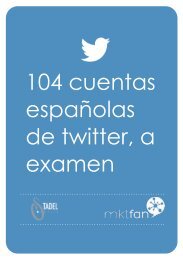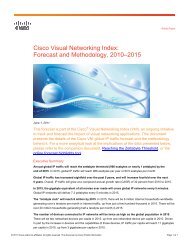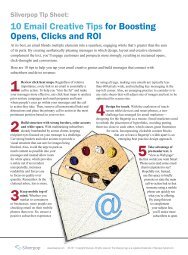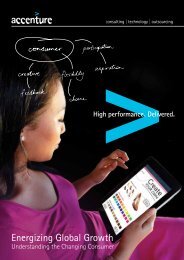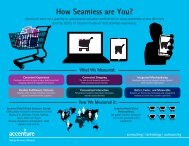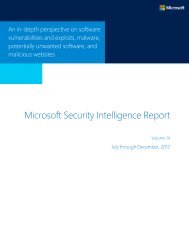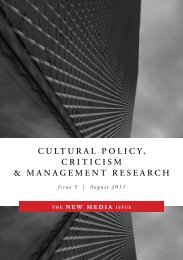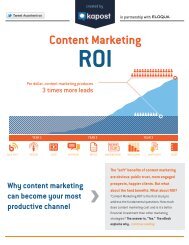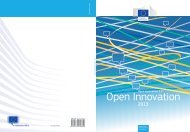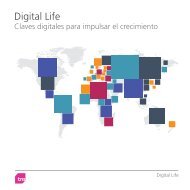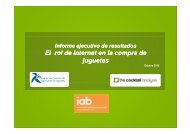How Teachers Are Using Technology at Home and in ... - Prisa Digital
How Teachers Are Using Technology at Home and in ... - Prisa Digital
How Teachers Are Using Technology at Home and in ... - Prisa Digital
Create successful ePaper yourself
Turn your PDF publications into a flip-book with our unique Google optimized e-Paper software.
There are notable gener<strong>at</strong>ional differences <strong>in</strong> how teachers experience the<br />
impact of digital technologies <strong>in</strong> their professional lives<br />
As is the case among the full adult popul<strong>at</strong>ion, differences <strong>in</strong> technology use emerge between older <strong>and</strong><br />
younger teachers. Specifically:<br />
<strong>Teachers</strong> under age 35 are more likely than teachers age 55 <strong>and</strong> older to describe themselves as<br />
“very confident” when it comes to us<strong>in</strong>g new digital technologies (64% vs. 44%)<br />
Conversely, the oldest teachers (age 55 <strong>and</strong> older) are more than twice as likely as their<br />
colleagues under age 35 to say their students know more than they do about us<strong>in</strong>g the newest<br />
digital tools (59% vs. 23%)<br />
45% of teachers under age 35 have their students develop or share work on a website, wiki or<br />
blog, compared with 34% of teachers ages 55 <strong>and</strong> older<br />
Younger teachers are also more likely than the oldest teachers to have students particip<strong>at</strong>e <strong>in</strong><br />
onl<strong>in</strong>e discussions (45% v. 32%) <strong>and</strong> use collabor<strong>at</strong>ive web-based tools such as GoogleDocs to<br />
edit their work (41% v. 34%)<br />
Younger teachers are more likely to “very often” draw on colleagues for ideas about how to use<br />
new technologies <strong>in</strong> the classroom (22% of teachers under age 35 do this), when compared with<br />
teachers age 35-54 (16%) <strong>and</strong> teachers age 55 <strong>and</strong> older (13%)<br />
At times, teachers’ own use of digital tools can run counter to their concerns<br />
about <strong>and</strong> perceptions of student use<br />
In an earlier report on these d<strong>at</strong>a, we found th<strong>at</strong> teachers expressed some concerns about wh<strong>at</strong> they<br />
saw as students’ overreliance on search eng<strong>in</strong>es to f<strong>in</strong>d <strong>in</strong>form<strong>at</strong>ion <strong>and</strong> complete research projects. In<br />
their words, their students <strong>in</strong>creas<strong>in</strong>gly “equ<strong>at</strong>e research with Googl<strong>in</strong>g,” <strong>and</strong> use search eng<strong>in</strong>es <strong>in</strong> lieu<br />
of more traditional sources without sufficient ability to judge the quality of <strong>in</strong>form<strong>at</strong>ion they f<strong>in</strong>d onl<strong>in</strong>e.<br />
Regard<strong>in</strong>g students’ use of search eng<strong>in</strong>es, the survey found:<br />
76% of AP <strong>and</strong> NWP teachers “strongly agree th<strong>at</strong> “search eng<strong>in</strong>es have conditioned students to<br />
expect to be able to f<strong>in</strong>d <strong>in</strong>form<strong>at</strong>ion quickly <strong>and</strong> easily”<br />
83% agree th<strong>at</strong> “the amount of <strong>in</strong>form<strong>at</strong>ion available onl<strong>in</strong>e today is overwhelm<strong>in</strong>g for most<br />
students”<br />
71% agree th<strong>at</strong> “today’s digital technologies discourage students from f<strong>in</strong>d<strong>in</strong>g <strong>and</strong> us<strong>in</strong>g a wide<br />
range of sources for their research”<br />
60% agree with the notion th<strong>at</strong> “today’s digital technologies make it harder for students to f<strong>in</strong>d<br />
<strong>and</strong> use credible sources of <strong>in</strong>form<strong>at</strong>ion”<br />
Yet, the survey also confirms th<strong>at</strong> search eng<strong>in</strong>es, <strong>and</strong> Google <strong>in</strong> particular, are key resources for AP <strong>and</strong><br />
NWP teachers. Specifically:<br />
99% of AP <strong>and</strong> NWP teachers use search eng<strong>in</strong>es to f<strong>in</strong>d <strong>in</strong>form<strong>at</strong>ion onl<strong>in</strong>e<br />
90% name Google as the search tool they use most often<br />
Virtually all AP <strong>and</strong> NWP teachers (99%) use the <strong>in</strong>ternet “to do work or research for their job”<br />
p e w<strong>in</strong>ter n e t .o r g 5



